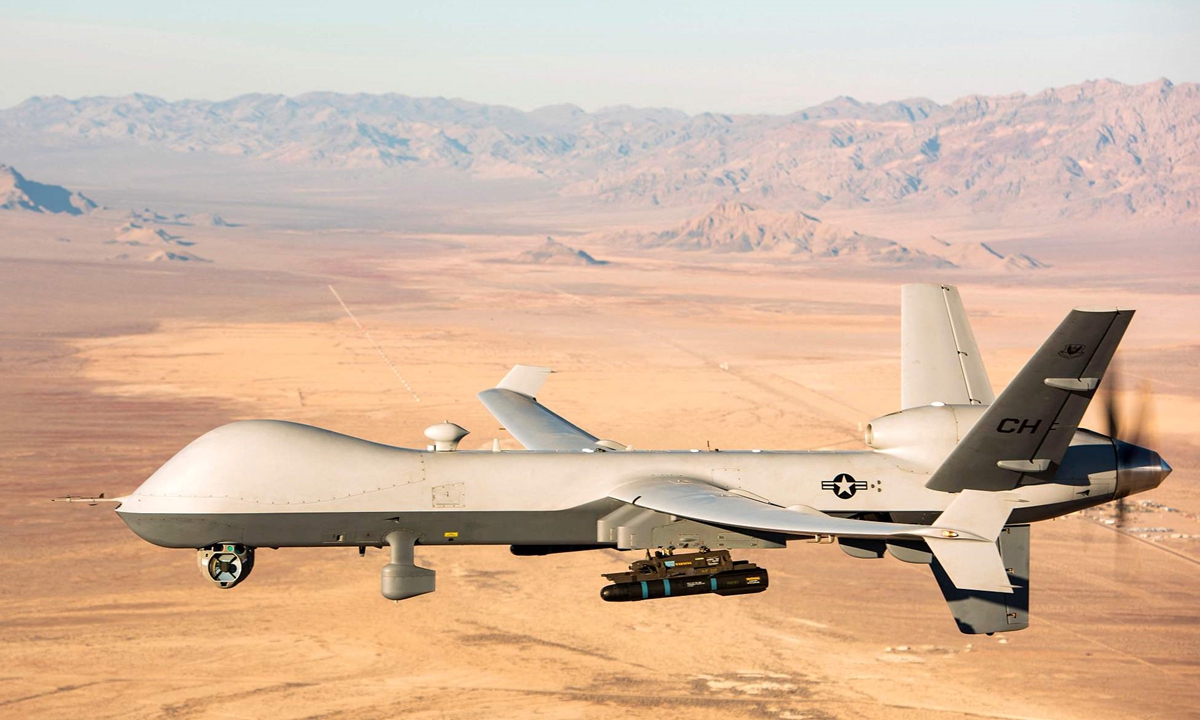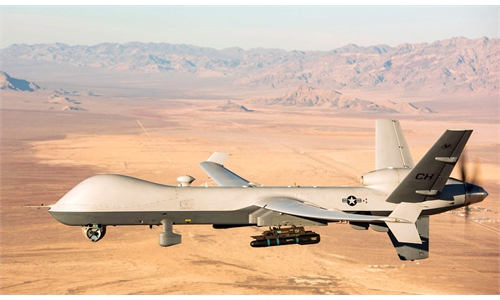Why it is always US military plane that runs into ‘accident’: Global Times editorial

File photo of an MQ-9 Reaper drone. Photo: VCG
On Tuesday local time, a US military drone crashed over the Black Sea, which made the whole world nervous. People's first reaction was not to discuss who is responsible, but fear. Some media said that this underlines "the risk of direct confrontation" between the US and Russia since the outbreak of the Russia-Ukraine conflict. It may be inaccurate to say so, but it reflects the high degree of international public opinion's attention to this incident. The direct consequence of the incident is that it brought the tension on the Russia-Ukraine battlefield to the highest level since the conflict broke out, and may trigger an unexpected escalation of reactions. This is obviously something the whole world does not want to see.The US military lost an Air Force MQ-9 Reaper drone this time, and there were no casualties. The US and Russia disagree on how it fell. Moscow says it "did not use airborne weapons" on this occasion. It also claims its jet "did not come into contact" with the Reaper and the crash was a result of "sharp maneuvering." The US military said a Russian fighter jet had dumped fuel on an American drone over the Black Sea and then collided with it on Tuesday, causing the drone to crash. The US State Department has expressed its concerns about the incident to the Russian side. It may be that the US knows itself is partly to blame. The attitude of the US side is not too drastic. It is worth noting that the Reaper drone has repeatedly performed surveillance and precision strike missions in US military operations. It was this drone that was used by the Trump administration to assassinate Iranian top general Qasem Soleimani. Regarding the drone that crashed in the Black Sea airspace this time, US officials were not willing to disclose whether it was armed.
The matter is under control and we hope the US and Russia can handle it rationally. Judging from the current reaction, neither Moscow nor Washington wants to escalate the crisis. It must be said that the tense situation in the region cannot withstand several incidents like this. It is like two people smashing rocks next to a pile of explosives. Who can guarantee that there will be no sparks, or that the sparks will not detonate the explosives? This incident should not just end in the mutual accusations between the US and Russia, but should arouse the vigilance of the two sides, especially the US, and become an opportunity for both parties to rebuild a crisis management and control mechanism.
The Cuban Missile Crisis during the Cold War shocked the world, but there was no such a crisis after that, because both the US and the Soviet Union fully realized that such an incident is too dangerous to be allowed to happen again. On the basis of this rare and important consensus, the US and the Soviet Union each took a step back, and then launched nuclear arms control negotiations, so that the "Cold War" did not turn into a destructive "hot war."
Of course, this drone crash cannot be compared with the Cuban Missile Crisis, but some laws and logic are common. Today, Washington is pushing for major power confrontation again, dragging the world to the brink of a new Cold War, and the possibility of catastrophic consequences is increasing little by little. Just after the encounter between US and Russian military planes in the Black Sea, US National Security Council spokesperson John Kirby said it was "not uncommon" for Russian aircraft to intercept US aircraft over the Black Sea, which shows Washington is used to such "encounters."
The crash of the US military drone is an accidental event, but its occurrence has certain inevitability. After the end of the Cold War, similar incidents of military plane encounters, accidental crashes, and even jets being shot down happened many times, some of which seriously exacerbated regional tensions, and most of them were related to the US military. And its targets were often countries that Washington publicly regards as imaginary enemies. This is very telling. As the US conducts more and more military operations overseas, the frequency of its extreme provocations is also increasing. Meanwhile, the atmosphere of major power relations has been severely worsened, and bilateral constraints, exchanges and communication mechanisms such as Nuclear Arms Control Treaties have been severely damaged. Under such circumstances, the probability of misfires that would lead to the escalation and even loss of control of the situation is rising. There are constant reminders of emergencies that cannot be ignored.
Peace is so fragile, and crisis management is important, but reducing its occurrence from the root is even more critical. There is urgency to avoid a war that neither side wants to fight. This month marks the 20th anniversary of the US launching the Iraq War, and 20 years should be enough for the US and the international community to reflect deeply. As the Guardian said, "every time something like this happens, the world uses up a little bit more of its luck." Peace and stability of the world obviously cannot always rely on "luck."

